Gastroenterologist Resume Examples

Jul 18, 2024
|
12 min read
Master the art of crafting a gastroenterologist resume with tips that will get your career out of the gut and onto the fast track.
Rated by 348 people
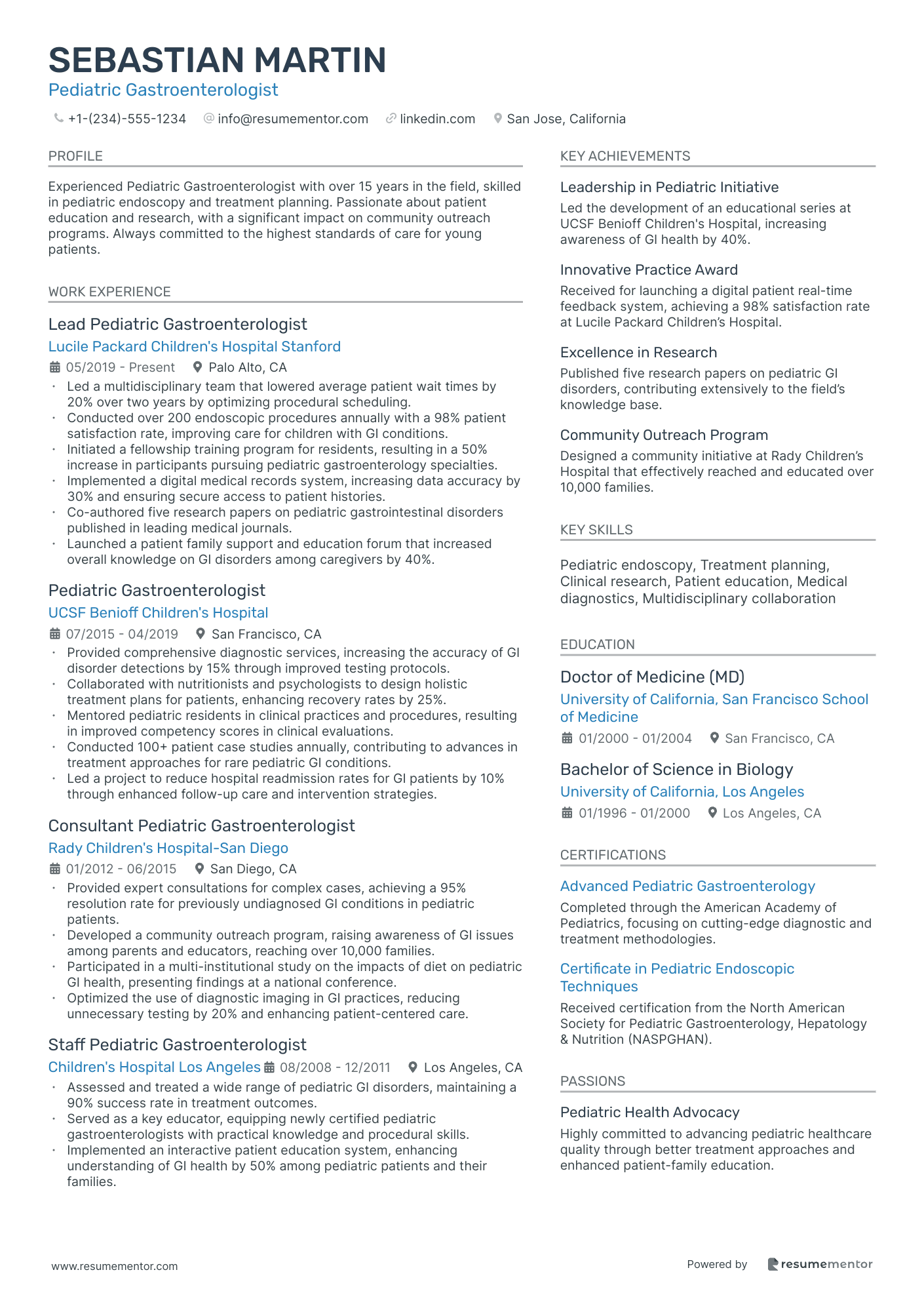
Pediatric Gastroenterologist
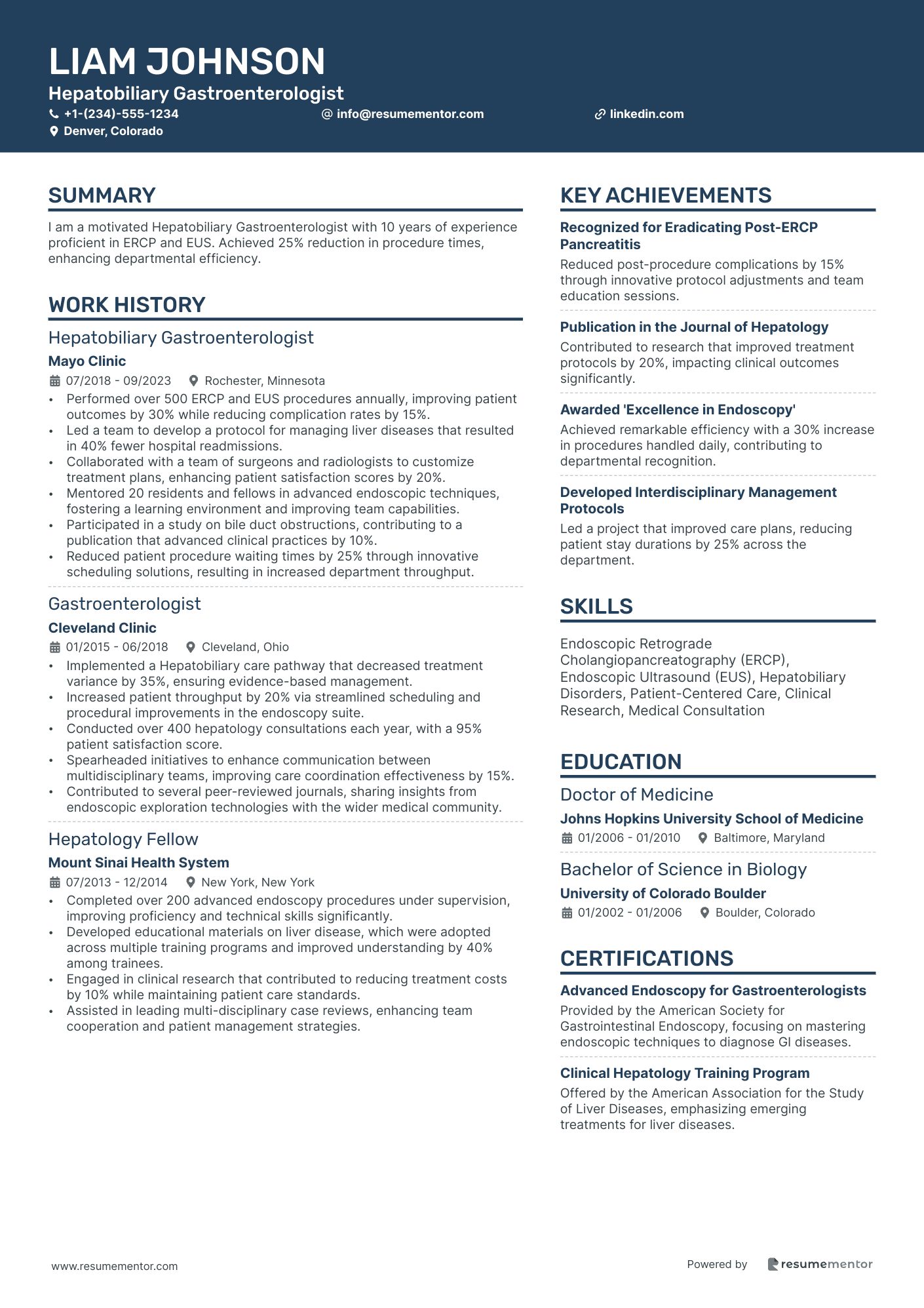
Hepatobiliary Gastroenterologist
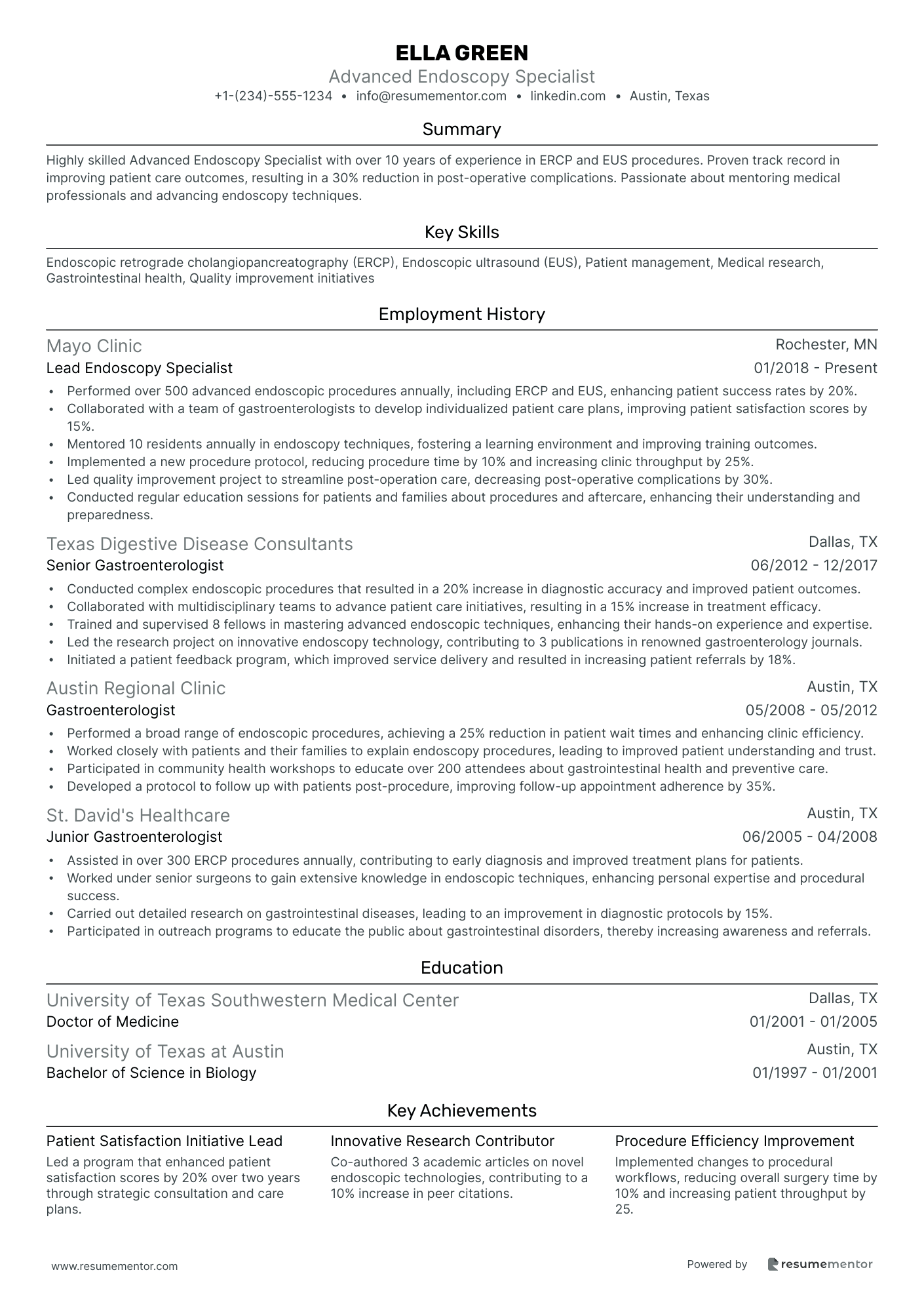
Advanced Endoscopy Specialist
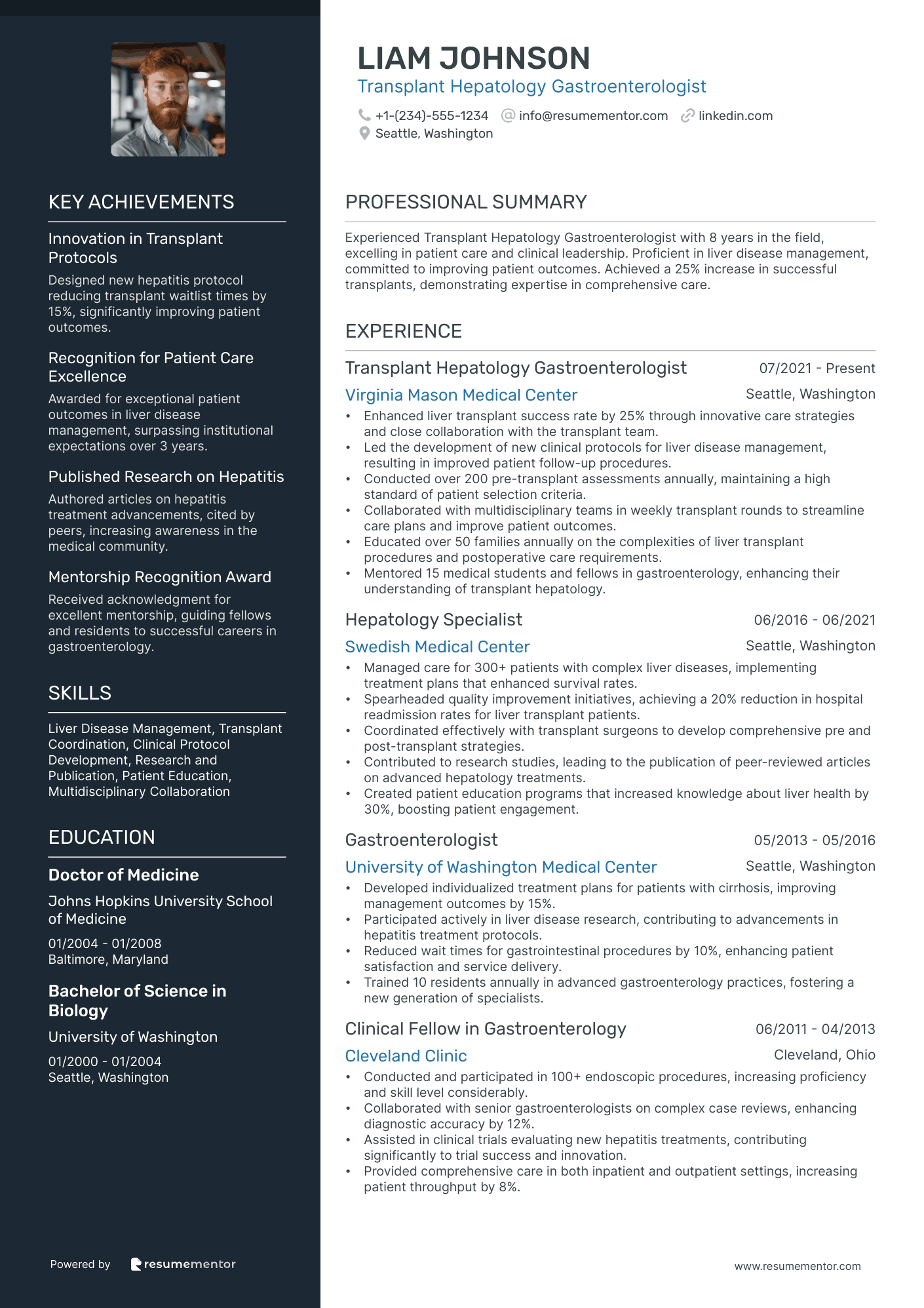
Transplant Hepatology Gastroenterologist
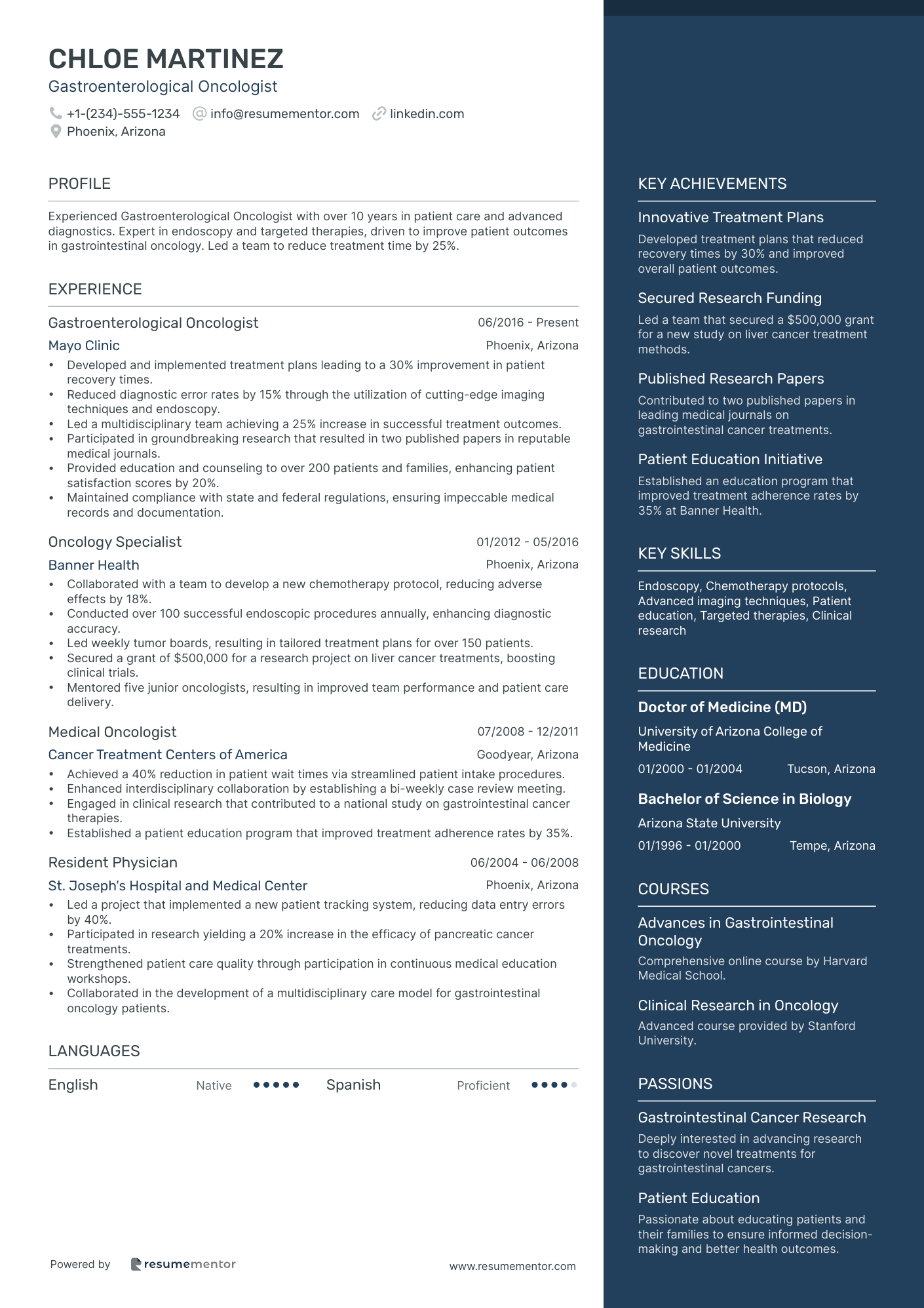
Gastroenterological Oncologist
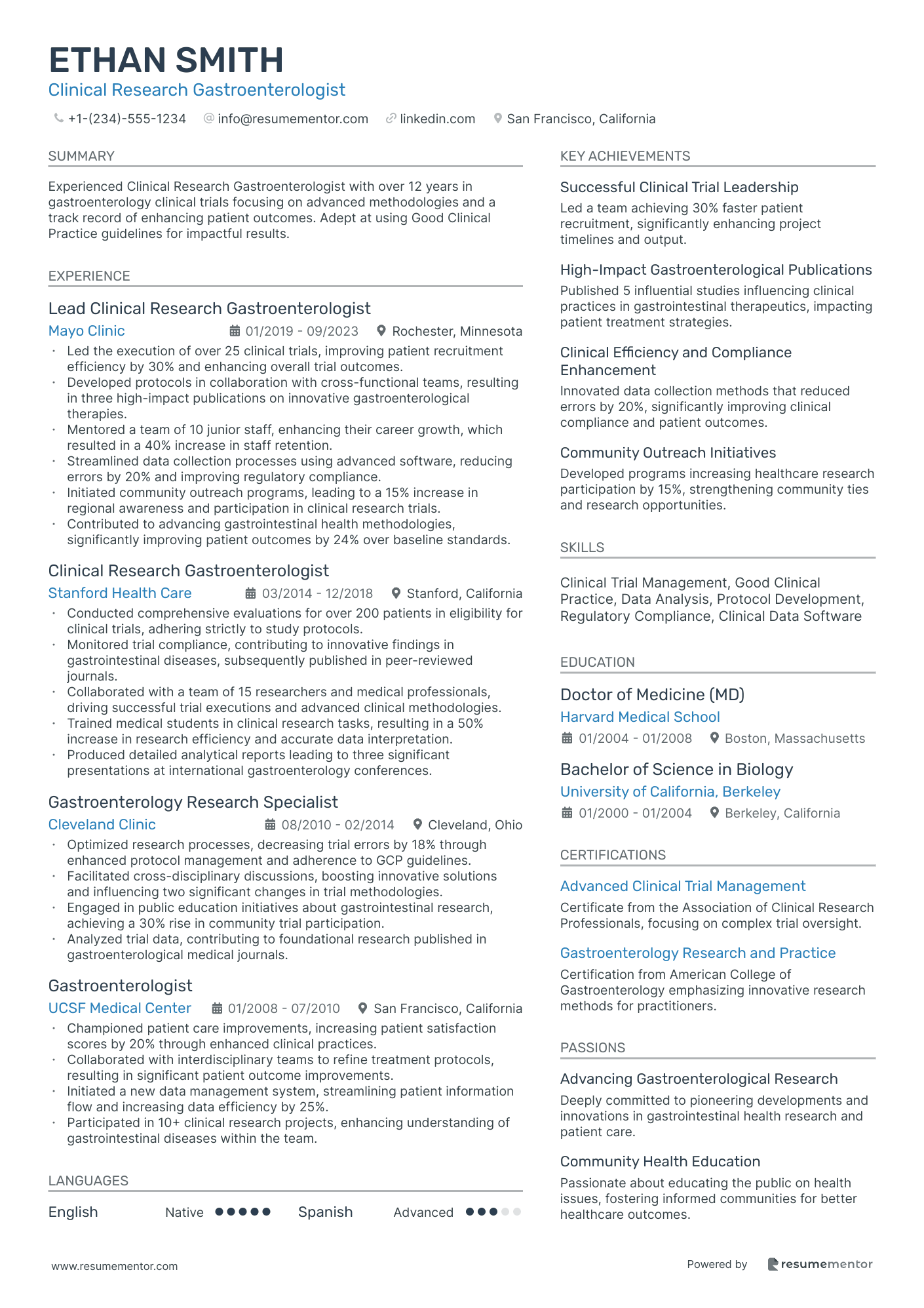
Clinical Research Gastroenterologist
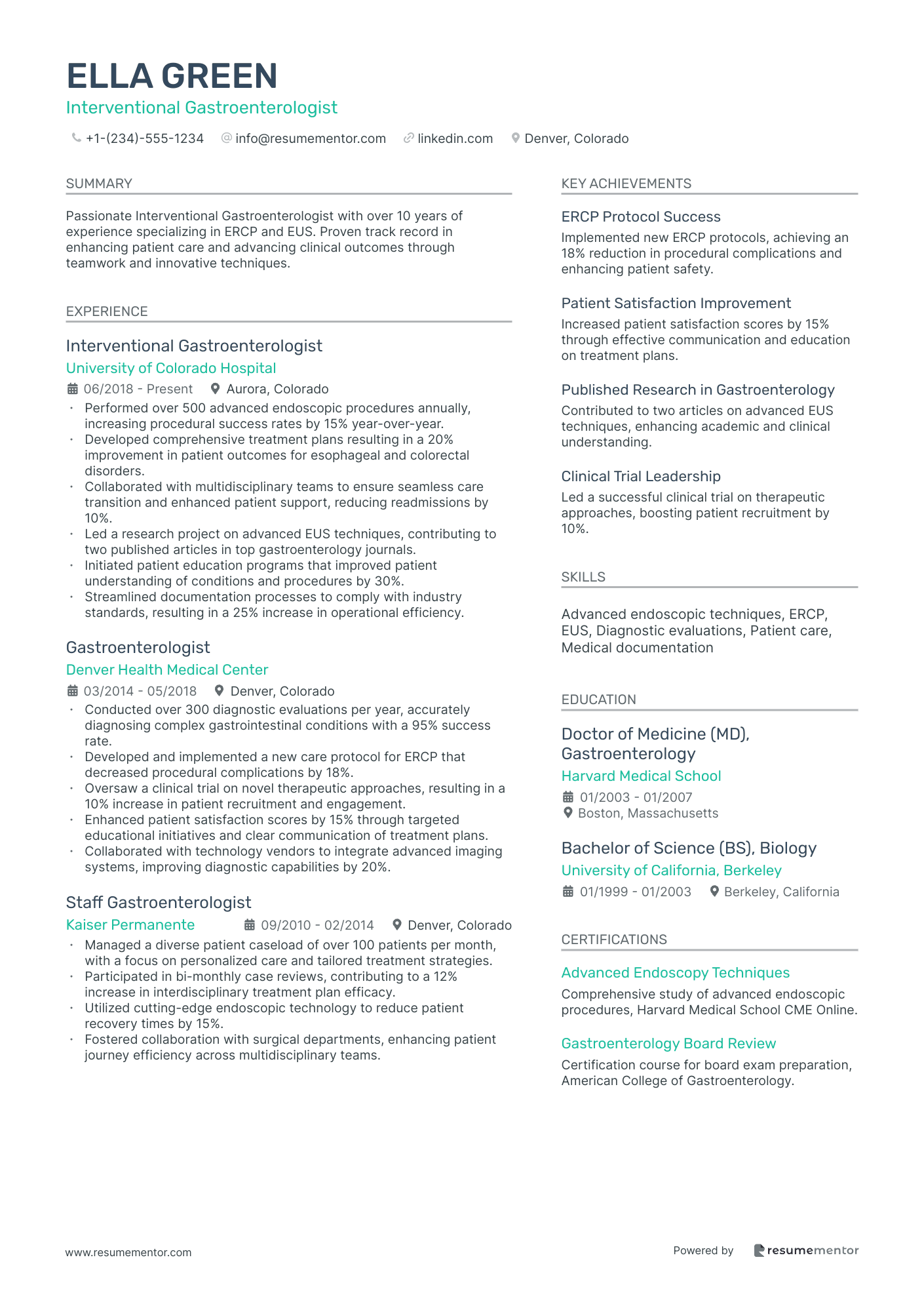
Interventional Gastroenterologist
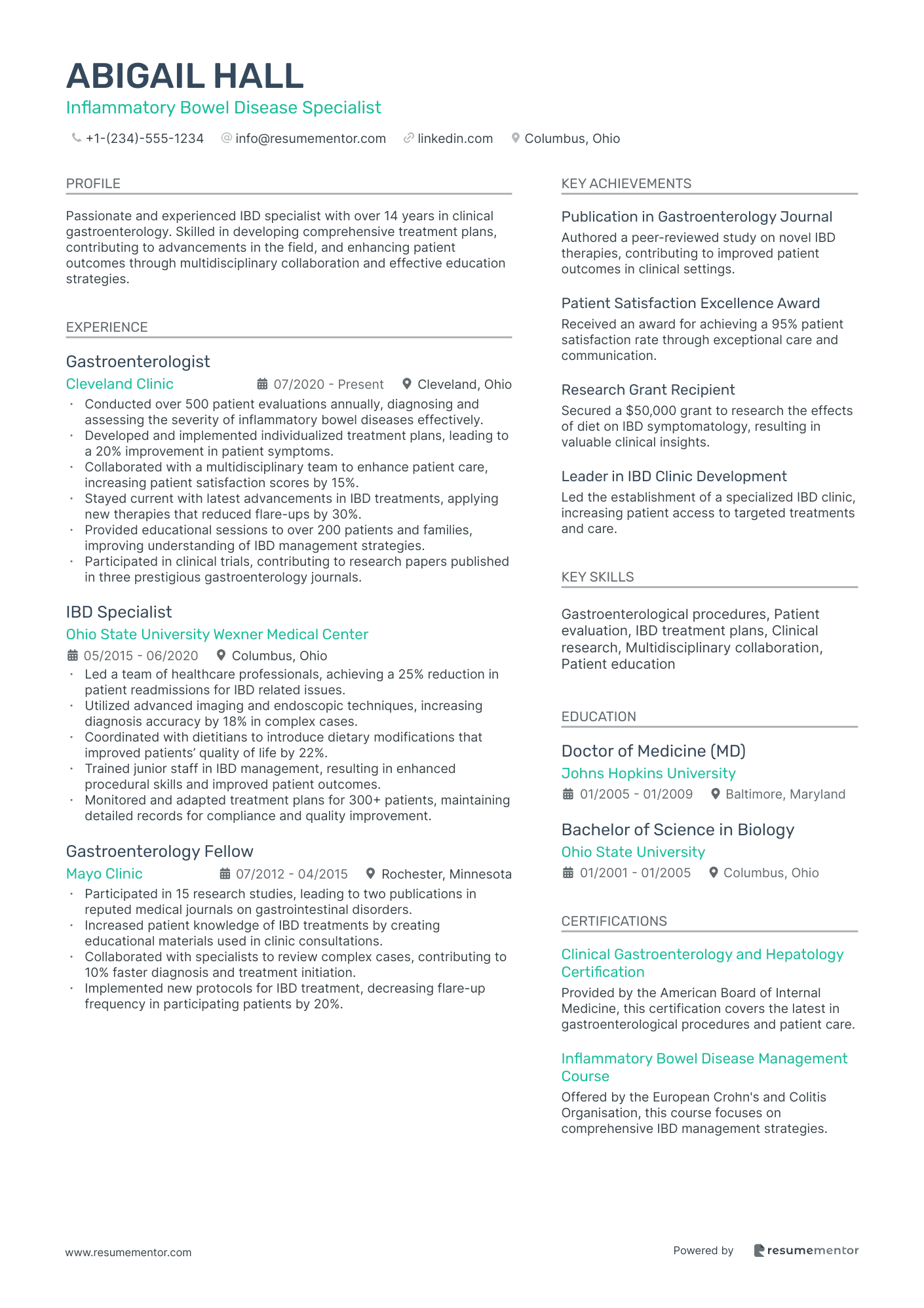
Inflammatory Bowel Disease Specialist
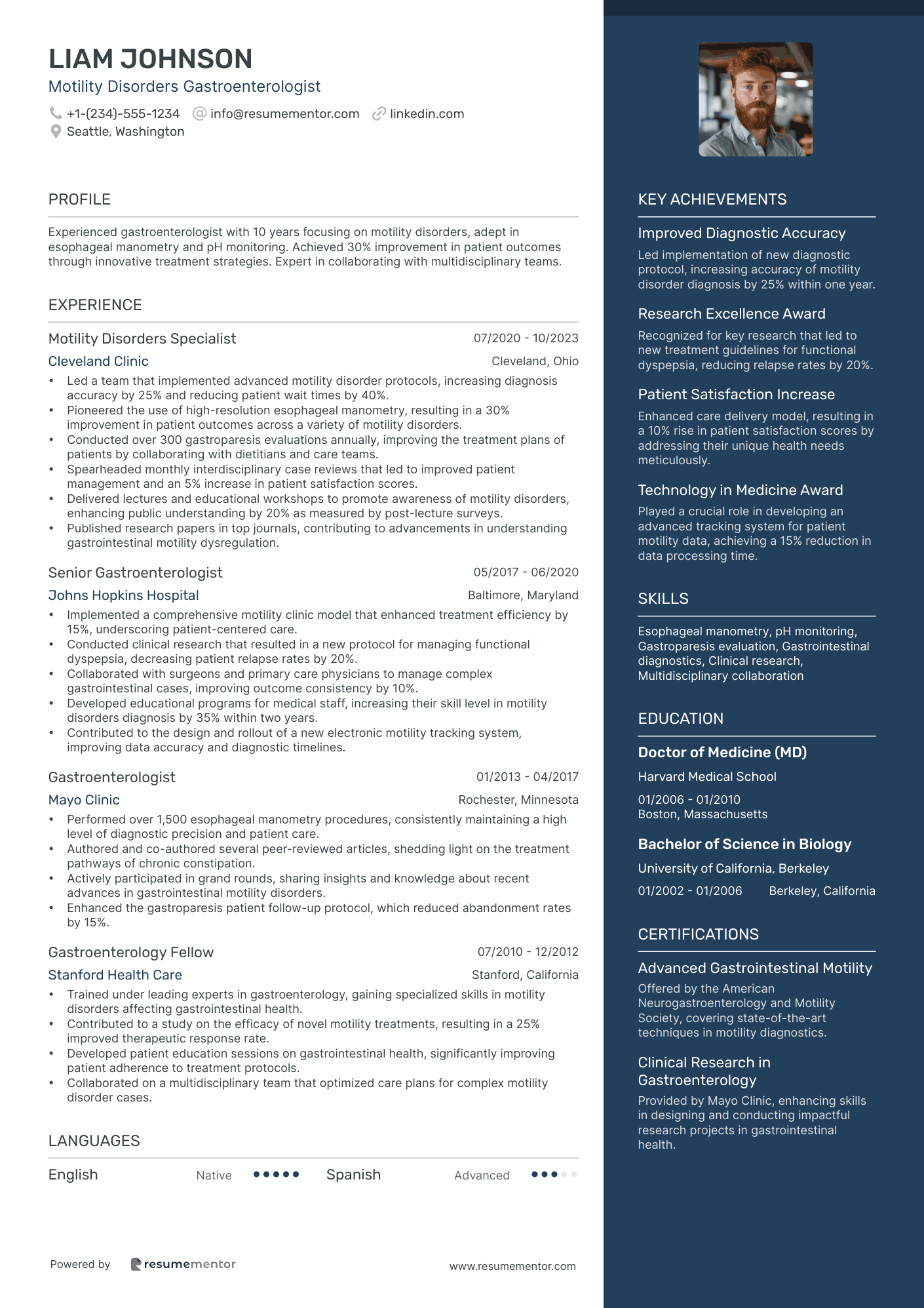
Motility Disorders Gastroenterologist
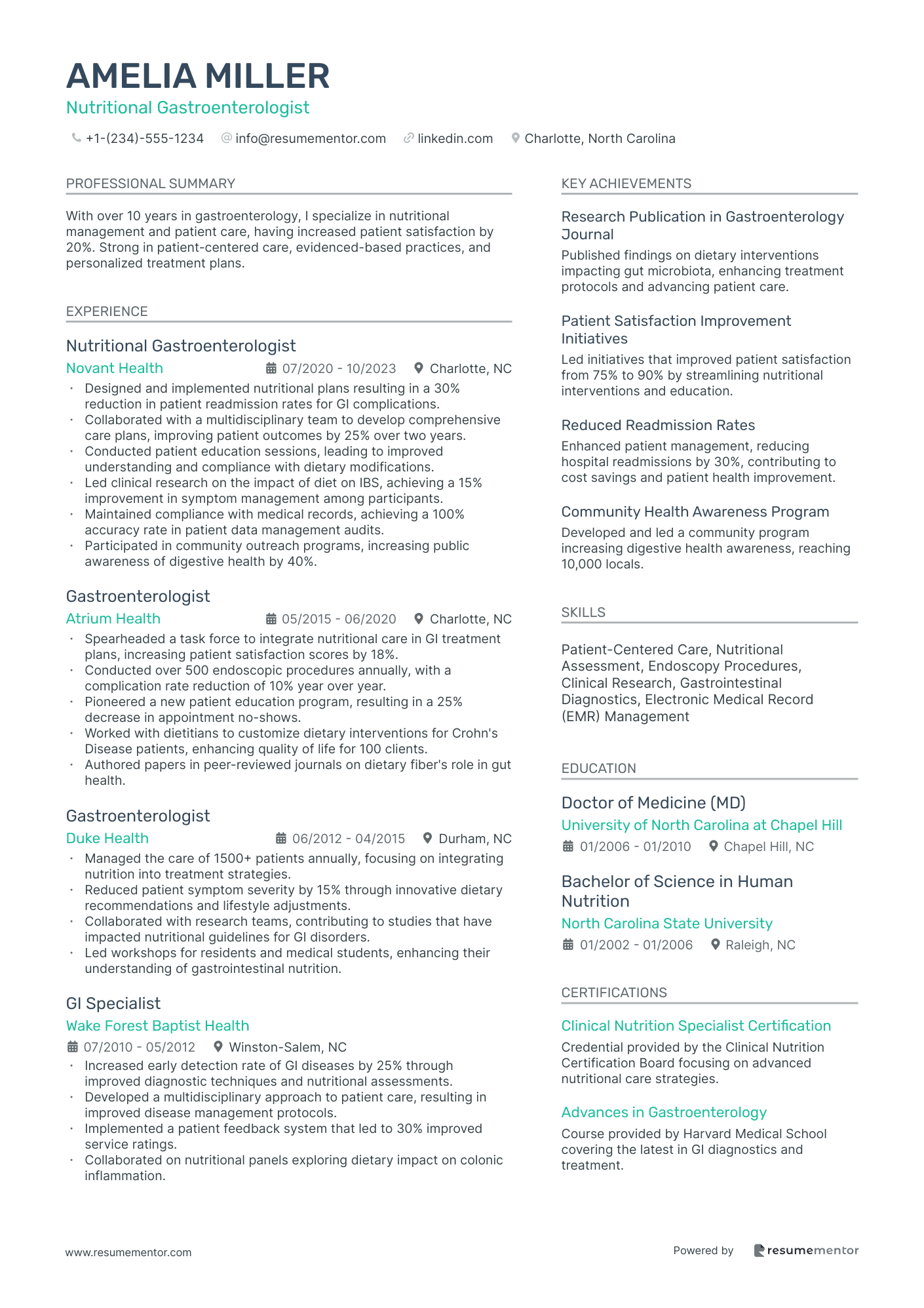
Nutritional Gastroenterologist

Pediatric Gastroenterologist resume sample
- •Led a multidisciplinary team that lowered average patient wait times by 20% over two years by optimizing procedural scheduling.
- •Conducted over 200 endoscopic procedures annually with a 98% patient satisfaction rate, improving care for children with GI conditions.
- •Initiated a fellowship training program for residents, resulting in a 50% increase in participants pursuing pediatric gastroenterology specialties.
- •Implemented a digital medical records system, increasing data accuracy by 30% and ensuring secure access to patient histories.
- •Co-authored five research papers on pediatric gastrointestinal disorders published in leading medical journals.
- •Launched a patient family support and education forum that increased overall knowledge on GI disorders among caregivers by 40%.
- •Provided comprehensive diagnostic services, increasing the accuracy of GI disorder detections by 15% through improved testing protocols.
- •Collaborated with nutritionists and psychologists to design holistic treatment plans for patients, enhancing recovery rates by 25%.
- •Mentored pediatric residents in clinical practices and procedures, resulting in improved competency scores in clinical evaluations.
- •Conducted 100+ patient case studies annually, contributing to advances in treatment approaches for rare pediatric GI conditions.
- •Led a project to reduce hospital readmission rates for GI patients by 10% through enhanced follow-up care and intervention strategies.
- •Provided expert consultations for complex cases, achieving a 95% resolution rate for previously undiagnosed GI conditions in pediatric patients.
- •Developed a community outreach program, raising awareness of GI issues among parents and educators, reaching over 10,000 families.
- •Participated in a multi-institutional study on the impacts of diet on pediatric GI health, presenting findings at a national conference.
- •Optimized the use of diagnostic imaging in GI practices, reducing unnecessary testing by 20% and enhancing patient-centered care.
- •Assessed and treated a wide range of pediatric GI disorders, maintaining a 90% success rate in treatment outcomes.
- •Served as a key educator, equipping newly certified pediatric gastroenterologists with practical knowledge and procedural skills.
- •Implemented an interactive patient education system, enhancing understanding of GI health by 50% among pediatric patients and their families.
Hepatobiliary Gastroenterologist resume sample
- •Performed over 500 ERCP and EUS procedures annually, improving patient outcomes by 30% while reducing complication rates by 15%.
- •Led a team to develop a protocol for managing liver diseases that resulted in 40% fewer hospital readmissions.
- •Collaborated with a team of surgeons and radiologists to customize treatment plans, enhancing patient satisfaction scores by 20%.
- •Mentored 20 residents and fellows in advanced endoscopic techniques, fostering a learning environment and improving team capabilities.
- •Participated in a study on bile duct obstructions, contributing to a publication that advanced clinical practices by 10%.
- •Reduced patient procedure waiting times by 25% through innovative scheduling solutions, resulting in increased department throughput.
- •Implemented a Hepatobiliary care pathway that decreased treatment variance by 35%, ensuring evidence-based management.
- •Increased patient throughput by 20% via streamlined scheduling and procedural improvements in the endoscopy suite.
- •Conducted over 400 hepatology consultations each year, with a 95% patient satisfaction score.
- •Spearheaded initiatives to enhance communication between multidisciplinary teams, improving care coordination effectiveness by 15%.
- •Contributed to several peer-reviewed journals, sharing insights from endoscopic exploration technologies with the wider medical community.
- •Completed over 200 advanced endoscopy procedures under supervision, improving proficiency and technical skills significantly.
- •Developed educational materials on liver disease, which were adopted across multiple training programs and improved understanding by 40% among trainees.
- •Engaged in clinical research that contributed to reducing treatment costs by 10% while maintaining patient care standards.
- •Assisted in leading multi-disciplinary case reviews, enhancing team cooperation and patient management strategies.
- •Gained foundational experience in diagnosing and managing liver and pancreatic diseases, conducting 150 patient engagements.
- •Received 'Resident of the Year' award for excellence in patient management and interdisciplinary collaboration.
- •Participated in a quality improvement project that reduced medication errors by 20% within the internal medicine department.
- •Supervised medical students in bedside procedures, enhancing instructional skills and academic support.
Advanced Endoscopy Specialist resume sample
- •Performed over 500 advanced endoscopic procedures annually, including ERCP and EUS, enhancing patient success rates by 20%.
- •Collaborated with a team of gastroenterologists to develop individualized patient care plans, improving patient satisfaction scores by 15%.
- •Mentored 10 residents annually in endoscopy techniques, fostering a learning environment and improving training outcomes.
- •Implemented a new procedure protocol, reducing procedure time by 10% and increasing clinic throughput by 25%.
- •Led quality improvement project to streamline post-operation care, decreasing post-operative complications by 30%.
- •Conducted regular education sessions for patients and families about procedures and aftercare, enhancing their understanding and preparedness.
- •Conducted complex endoscopic procedures that resulted in a 20% increase in diagnostic accuracy and improved patient outcomes.
- •Collaborated with multidisciplinary teams to advance patient care initiatives, resulting in a 15% increase in treatment efficacy.
- •Trained and supervised 8 fellows in mastering advanced endoscopic techniques, enhancing their hands-on experience and expertise.
- •Led the research project on innovative endoscopy technology, contributing to 3 publications in renowned gastroenterology journals.
- •Initiated a patient feedback program, which improved service delivery and resulted in increasing patient referrals by 18%.
- •Performed a broad range of endoscopic procedures, achieving a 25% reduction in patient wait times and enhancing clinic efficiency.
- •Worked closely with patients and their families to explain endoscopy procedures, leading to improved patient understanding and trust.
- •Participated in community health workshops to educate over 200 attendees about gastrointestinal health and preventive care.
- •Developed a protocol to follow up with patients post-procedure, improving follow-up appointment adherence by 35%.
- •Assisted in over 300 ERCP procedures annually, contributing to early diagnosis and improved treatment plans for patients.
- •Worked under senior surgeons to gain extensive knowledge in endoscopic techniques, enhancing personal expertise and procedural success.
- •Carried out detailed research on gastrointestinal diseases, leading to an improvement in diagnostic protocols by 15%.
- •Participated in outreach programs to educate the public about gastrointestinal disorders, thereby increasing awareness and referrals.
Transplant Hepatology Gastroenterologist resume sample
- •Enhanced liver transplant success rate by 25% through innovative care strategies and close collaboration with the transplant team.
- •Led the development of new clinical protocols for liver disease management, resulting in improved patient follow-up procedures.
- •Conducted over 200 pre-transplant assessments annually, maintaining a high standard of patient selection criteria.
- •Collaborated with multidisciplinary teams in weekly transplant rounds to streamline care plans and improve patient outcomes.
- •Educated over 50 families annually on the complexities of liver transplant procedures and postoperative care requirements.
- •Mentored 15 medical students and fellows in gastroenterology, enhancing their understanding of transplant hepatology.
- •Managed care for 300+ patients with complex liver diseases, implementing treatment plans that enhanced survival rates.
- •Spearheaded quality improvement initiatives, achieving a 20% reduction in hospital readmission rates for liver transplant patients.
- •Coordinated effectively with transplant surgeons to develop comprehensive pre and post-transplant strategies.
- •Contributed to research studies, leading to the publication of peer-reviewed articles on advanced hepatology treatments.
- •Created patient education programs that increased knowledge about liver health by 30%, boosting patient engagement.
- •Developed individualized treatment plans for patients with cirrhosis, improving management outcomes by 15%.
- •Participated actively in liver disease research, contributing to advancements in hepatitis treatment protocols.
- •Reduced wait times for gastrointestinal procedures by 10%, enhancing patient satisfaction and service delivery.
- •Trained 10 residents annually in advanced gastroenterology practices, fostering a new generation of specialists.
- •Conducted and participated in 100+ endoscopic procedures, increasing proficiency and skill level considerably.
- •Collaborated with senior gastroenterologists on complex case reviews, enhancing diagnostic accuracy by 12%.
- •Assisted in clinical trials evaluating new hepatitis treatments, contributing significantly to trial success and innovation.
- •Provided comprehensive care in both inpatient and outpatient settings, increasing patient throughput by 8%.
Gastroenterological Oncologist resume sample
- •Developed and implemented treatment plans leading to a 30% improvement in patient recovery times.
- •Reduced diagnostic error rates by 15% through the utilization of cutting-edge imaging techniques and endoscopy.
- •Led a multidisciplinary team achieving a 25% increase in successful treatment outcomes.
- •Participated in groundbreaking research that resulted in two published papers in reputable medical journals.
- •Provided education and counseling to over 200 patients and families, enhancing patient satisfaction scores by 20%.
- •Maintained compliance with state and federal regulations, ensuring impeccable medical records and documentation.
- •Collaborated with a team to develop a new chemotherapy protocol, reducing adverse effects by 18%.
- •Conducted over 100 successful endoscopic procedures annually, enhancing diagnostic accuracy.
- •Led weekly tumor boards, resulting in tailored treatment plans for over 150 patients.
- •Secured a grant of $500,000 for a research project on liver cancer treatments, boosting clinical trials.
- •Mentored five junior oncologists, resulting in improved team performance and patient care delivery.
- •Achieved a 40% reduction in patient wait times via streamlined patient intake procedures.
- •Enhanced interdisciplinary collaboration by establishing a bi-weekly case review meeting.
- •Engaged in clinical research that contributed to a national study on gastrointestinal cancer therapies.
- •Established a patient education program that improved treatment adherence rates by 35%.
- •Led a project that implemented a new patient tracking system, reducing data entry errors by 40%.
- •Participated in research yielding a 20% increase in the efficacy of pancreatic cancer treatments.
- •Strengthened patient care quality through participation in continuous medical education workshops.
- •Collaborated in the development of a multidisciplinary care model for gastrointestinal oncology patients.
Clinical Research Gastroenterologist resume sample
- •Led the execution of over 25 clinical trials, improving patient recruitment efficiency by 30% and enhancing overall trial outcomes.
- •Developed protocols in collaboration with cross-functional teams, resulting in three high-impact publications on innovative gastroenterological therapies.
- •Mentored a team of 10 junior staff, enhancing their career growth, which resulted in a 40% increase in staff retention.
- •Streamlined data collection processes using advanced software, reducing errors by 20% and improving regulatory compliance.
- •Initiated community outreach programs, leading to a 15% increase in regional awareness and participation in clinical research trials.
- •Contributed to advancing gastrointestinal health methodologies, significantly improving patient outcomes by 24% over baseline standards.
- •Conducted comprehensive evaluations for over 200 patients in eligibility for clinical trials, adhering strictly to study protocols.
- •Monitored trial compliance, contributing to innovative findings in gastrointestinal diseases, subsequently published in peer-reviewed journals.
- •Collaborated with a team of 15 researchers and medical professionals, driving successful trial executions and advanced clinical methodologies.
- •Trained medical students in clinical research tasks, resulting in a 50% increase in research efficiency and accurate data interpretation.
- •Produced detailed analytical reports leading to three significant presentations at international gastroenterology conferences.
- •Optimized research processes, decreasing trial errors by 18% through enhanced protocol management and adherence to GCP guidelines.
- •Facilitated cross-disciplinary discussions, boosting innovative solutions and influencing two significant changes in trial methodologies.
- •Engaged in public education initiatives about gastrointestinal research, achieving a 30% rise in community trial participation.
- •Analyzed trial data, contributing to foundational research published in gastroenterological medical journals.
- •Championed patient care improvements, increasing patient satisfaction scores by 20% through enhanced clinical practices.
- •Collaborated with interdisciplinary teams to refine treatment protocols, resulting in significant patient outcome improvements.
- •Initiated a new data management system, streamlining patient information flow and increasing data efficiency by 25%.
- •Participated in 10+ clinical research projects, enhancing understanding of gastrointestinal diseases within the team.
Interventional Gastroenterologist resume sample
- •Performed over 500 advanced endoscopic procedures annually, increasing procedural success rates by 15% year-over-year.
- •Developed comprehensive treatment plans resulting in a 20% improvement in patient outcomes for esophageal and colorectal disorders.
- •Collaborated with multidisciplinary teams to ensure seamless care transition and enhanced patient support, reducing readmissions by 10%.
- •Led a research project on advanced EUS techniques, contributing to two published articles in top gastroenterology journals.
- •Initiated patient education programs that improved patient understanding of conditions and procedures by 30%.
- •Streamlined documentation processes to comply with industry standards, resulting in a 25% increase in operational efficiency.
- •Conducted over 300 diagnostic evaluations per year, accurately diagnosing complex gastrointestinal conditions with a 95% success rate.
- •Developed and implemented a new care protocol for ERCP that decreased procedural complications by 18%.
- •Oversaw a clinical trial on novel therapeutic approaches, resulting in a 10% increase in patient recruitment and engagement.
- •Enhanced patient satisfaction scores by 15% through targeted educational initiatives and clear communication of treatment plans.
- •Collaborated with technology vendors to integrate advanced imaging systems, improving diagnostic capabilities by 20%.
- •Managed a diverse patient caseload of over 100 patients per month, with a focus on personalized care and tailored treatment strategies.
- •Participated in bi-monthly case reviews, contributing to a 12% increase in interdisciplinary treatment plan efficacy.
- •Utilized cutting-edge endoscopic technology to reduce patient recovery times by 15%.
- •Fostered collaboration with surgical departments, enhancing patient journey efficiency across multidisciplinary teams.
- •Successfully completed over 250 hands-on advanced endoscopic procedures, gaining expertise in interventional techniques.
- •Presented research findings on colorectal pathologies at national conferences, receiving recognition for innovative approaches.
- •Engaged in collaborative patient management with oncology teams, reducing diagnostic delays by 20%.
- •Led a fellowship project focusing on esophageal disorders, contributing to a departmental 5% improvement in early detection rates.
Inflammatory Bowel Disease Specialist resume sample
- •Conducted over 500 patient evaluations annually, diagnosing and assessing the severity of inflammatory bowel diseases effectively.
- •Developed and implemented individualized treatment plans, leading to a 20% improvement in patient symptoms.
- •Collaborated with a multidisciplinary team to enhance patient care, increasing patient satisfaction scores by 15%.
- •Stayed current with latest advancements in IBD treatments, applying new therapies that reduced flare-ups by 30%.
- •Provided educational sessions to over 200 patients and families, improving understanding of IBD management strategies.
- •Participated in clinical trials, contributing to research papers published in three prestigious gastroenterology journals.
- •Led a team of healthcare professionals, achieving a 25% reduction in patient readmissions for IBD related issues.
- •Utilized advanced imaging and endoscopic techniques, increasing diagnosis accuracy by 18% in complex cases.
- •Coordinated with dietitians to introduce dietary modifications that improved patients’ quality of life by 22%.
- •Trained junior staff in IBD management, resulting in enhanced procedural skills and improved patient outcomes.
- •Monitored and adapted treatment plans for 300+ patients, maintaining detailed records for compliance and quality improvement.
- •Participated in 15 research studies, leading to two publications in reputed medical journals on gastrointestinal disorders.
- •Increased patient knowledge of IBD treatments by creating educational materials used in clinic consultations.
- •Collaborated with specialists to review complex cases, contributing to 10% faster diagnosis and treatment initiation.
- •Implemented new protocols for IBD treatment, decreasing flare-up frequency in participating patients by 20%.
- •Managed care for over 100 IBD patients, enhancing treatment adherence by 15% through personalized plans.
- •Conducted daily rounds with senior staff, gaining experience in the management of complex gastrointestinal disorders.
- •Assisted in performing endoscopic procedures, improving hands-on skills and patient care standards.
- •Facilitated 5 patient education workshops focusing on lifestyle interventions and IBD management.
Motility Disorders Gastroenterologist resume sample
- •Led a team that implemented advanced motility disorder protocols, increasing diagnosis accuracy by 25% and reducing patient wait times by 40%.
- •Pioneered the use of high-resolution esophageal manometry, resulting in a 30% improvement in patient outcomes across a variety of motility disorders.
- •Conducted over 300 gastroparesis evaluations annually, improving the treatment plans of patients by collaborating with dietitians and care teams.
- •Spearheaded monthly interdisciplinary case reviews that led to improved patient management and an 5% increase in patient satisfaction scores.
- •Delivered lectures and educational workshops to promote awareness of motility disorders, enhancing public understanding by 20% as measured by post-lecture surveys.
- •Published research papers in top journals, contributing to advancements in understanding gastrointestinal motility dysregulation.
- •Implemented a comprehensive motility clinic model that enhanced treatment efficiency by 15%, underscoring patient-centered care.
- •Conducted clinical research that resulted in a new protocol for managing functional dyspepsia, decreasing patient relapse rates by 20%.
- •Collaborated with surgeons and primary care physicians to manage complex gastrointestinal cases, improving outcome consistency by 10%.
- •Developed educational programs for medical staff, increasing their skill level in motility disorders diagnosis by 35% within two years.
- •Contributed to the design and rollout of a new electronic motility tracking system, improving data accuracy and diagnostic timelines.
- •Performed over 1,500 esophageal manometry procedures, consistently maintaining a high level of diagnostic precision and patient care.
- •Authored and co-authored several peer-reviewed articles, shedding light on the treatment pathways of chronic constipation.
- •Actively participated in grand rounds, sharing insights and knowledge about recent advances in gastrointestinal motility disorders.
- •Enhanced the gastroparesis patient follow-up protocol, which reduced abandonment rates by 15%.
- •Trained under leading experts in gastroenterology, gaining specialized skills in motility disorders affecting gastrointestinal health.
- •Contributed to a study on the efficacy of novel motility treatments, resulting in a 25% improved therapeutic response rate.
- •Developed patient education sessions on gastrointestinal health, significantly improving patient adherence to treatment protocols.
- •Collaborated on a multidisciplinary team that optimized care plans for complex motility disorder cases.
Nutritional Gastroenterologist resume sample
- •Designed and implemented nutritional plans resulting in a 30% reduction in patient readmission rates for GI complications.
- •Collaborated with a multidisciplinary team to develop comprehensive care plans, improving patient outcomes by 25% over two years.
- •Conducted patient education sessions, leading to improved understanding and compliance with dietary modifications.
- •Led clinical research on the impact of diet on IBS, achieving a 15% improvement in symptom management among participants.
- •Maintained compliance with medical records, achieving a 100% accuracy rate in patient data management audits.
- •Participated in community outreach programs, increasing public awareness of digestive health by 40%.
- •Spearheaded a task force to integrate nutritional care in GI treatment plans, increasing patient satisfaction scores by 18%.
- •Conducted over 500 endoscopic procedures annually, with a complication rate reduction of 10% year over year.
- •Pioneered a new patient education program, resulting in a 25% decrease in appointment no-shows.
- •Worked with dietitians to customize dietary interventions for Crohn's Disease patients, enhancing quality of life for 100 clients.
- •Authored papers in peer-reviewed journals on dietary fiber's role in gut health.
- •Managed the care of 1500+ patients annually, focusing on integrating nutrition into treatment strategies.
- •Reduced patient symptom severity by 15% through innovative dietary recommendations and lifestyle adjustments.
- •Collaborated with research teams, contributing to studies that have impacted nutritional guidelines for GI disorders.
- •Led workshops for residents and medical students, enhancing their understanding of gastrointestinal nutrition.
- •Increased early detection rate of GI diseases by 25% through improved diagnostic techniques and nutritional assessments.
- •Developed a multidisciplinary approach to patient care, resulting in improved disease management protocols.
- •Implemented a patient feedback system that led to 30% improved service ratings.
- •Collaborated on nutritional panels exploring dietary impact on colonic inflammation.
Crafting a gastroenterologist resume is much like preparing for a complex procedure, requiring precision and clarity. As a specialist in this field, your extensive medical expertise is your greatest asset, yet transforming those skills into a compelling resume can feel challenging. Your invaluable work deserves a resume that conveys your abilities effectively, helping you stand out amidst years of rigorous study and hands-on experience.
This is where using a resume template becomes essential, providing a clear and organized structure to guide you. With the right template, you can focus on showcasing the content that matters most—your clinical skills and research accomplishments—in a way that resonates with potential employers. It ensures each important detail finds its place, leaving a lasting impression.
Finding the perfect position is about more than just distributing resumes; it’s about making a memorable first impression. A well-crafted resume can be the key to unlocking new opportunities, fueling your career growth. By choosing the right template, your extensive experience and achievements can truly shine, setting you apart from the rest.
If the thought of writing a resume feels daunting, know that you’re not alone. Many in your field share this sentiment. However, with a structured approach, you can confidently present your professional journey. This guide will lead you through the process step by step, ensuring your resume is as seamless as your skill set. Let’s begin crafting a resume that truly captures your unique journey in gastroenterology.
Key Takeaways
- Utilizing a resume template is crucial for crafting a well-organized and impactful resume that highlights clinical skills and research achievements effectively.
- A chronological resume format is beneficial for clearly presenting a stable work history and career progression, making it easier for employers to assess suitability.
- Careful font selection and proper formatting, such as using PDFs and maintaining appropriate margins, ensure the resume appears professional and easy to read.
- Highlight quantifiable accomplishments and use action-oriented language in the experience section to demonstrate tangible impacts and align with job descriptions.
- Incorporate essential hard and soft skills, educational background, and relevant certifications to communicate expertise and enhance your resume's appeal to employers.
What to focus on when writing your gastroenterologist resume
Your gastroenterologist resume should effectively highlight your medical expertise and enthusiasm for gastrointestinal health, ensuring you capture the interest of recruiters. Every section should reflect your dedication to patient care and advanced knowledge in the field. Each component of your resume deserves careful consideration to ensure clarity and impact.
How to structure your gastroenterologist resume
- Contact Information: Make sure to include your full name, phone number, email address, and LinkedIn profile. Keeping these details current and professional is essential to make a strong first impression—ensuring recruiters can easily reach you opens doors for future opportunities and dialogue.
- Professional Summary: This section should emphasize your experience and specialization in gastroenterology, underscoring your commitment to patient-centered care. Highlight any notable achievements or certifications that set you apart in your field—a well-crafted summary can immediately capture a recruiter's attention by showcasing your most relevant skills and experiences.
- Education: Clearly list your medical degree and any additional relevant training or fellowships. Specifying the institutions and graduation dates ensures a comprehensive view of your academic background in gastroenterology—it provides a roadmap of your professional development and areas of expertise.
- Licenses and Certifications: It's important to include your board certification in gastroenterology, along with any state licenses. Highlight any additional specialized certifications to reinforce your expertise—these credentials validate your capability and secure your standing in the medical field.
- Clinical Experience: Here, detail your work history with a focus on roles directly linked to gastroenterology. Using bullet points, describe your responsibilities and emphasize successful patient outcomes, demonstrating your hands-on proficiency—real-world examples of your experience provide tangible evidence of your ability to perform effectively under pressure.
- Research and Publications: If you’ve contributed to research projects or published papers, this section is key. Mention collaborations with leading gastroenterological journals or any contributions to medical advancements, showcasing your active engagement in the field—your involvement in research demonstrates a commitment to continual learning and advancement in gastroenterology.
This framework sets the stage for your resume, ensuring all essential elements are covered and flow naturally. Below, we'll delve deeper into each section to provide clear guidance for creating a standout gastroenterologist resume.
Which resume format to choose
Crafting a polished gastroenterologist resume is all about effectively showcasing your medical expertise and career achievements. Start with a chronological format; this choice is particularly beneficial if you have a stable work history, as it allows you to present your career progression clearly. This format emphasizes your experience and achievements in a straightforward manner, making it easier for potential employers to assess your suitability for the role.
The presentation of your resume is just as important, which is where font selection comes into play. Using modern fonts like Raleway, Lato, and Montserrat can give your resume a fresh and professional appearance. These fonts are not only visually appealing but also enhance readability—crucial for ensuring that busy hiring managers can easily digest your information.
Saving your resume in the right format is key to maintaining its integrity. A PDF is the best format because it preserves your formatting exactly as you intended it, regardless of the device or software used to open it. This ensures your resume remains professional and polished at all times.
When considering the overall layout, pay attention to your margins. Setting them at one inch on all sides gives your content the breathing room it needs, preventing it from appearing cluttered. A well-organized layout with sufficient white space not only improves readability but also demonstrates the attention to detail that is integral to a successful career in the medical field.
How to write a quantifiable resume experience section
To craft an outstanding gastroenterologist resume experience section, it's important to focus on impactful contributions and achievements in clinical settings. By structuring it in reverse chronological order, you naturally highlight the most recent and relevant experiences, making your strengths and successes in the field clear. Tailoring your resume to the job you're applying for ensures it resonates with potential employers. Consider the job description, using action words like "diagnosed," "administered," or "consulted" to match the duties and achievements they value. Typically, including experiences from the past 10-15 years is sufficient unless earlier roles offer significant relevance. Capturing job titles that demonstrate clear professional progression and align with the target role can highlight your career growth effectively. Emphasizing quantifiable achievements throughout showcases your ability to make a meaningful impact, transforming your experience section into a powerful narrative.
- •Increased patient satisfaction scores by 25% through personalized care plans.
- •Led a team to reduce procedural inefficiencies, enhancing departmental performance by 30%.
- •Implemented a new endoscopy procedure that decreased recovery time by 15%.
- •Authored and published 5 peer-reviewed articles on gastrointestinal disorders.
This experience section stands out by seamlessly aligning with key gastroenterology responsibilities and connecting each achievement to a broader professional narrative. Featuring measurable achievements not only showcases expertise but also highlights the tangible impact of your work, making your contributions instantly clear and credible. By tailoring your resume to match the job description, you address the employer's specific needs, demonstrating both attention to detail and a deep understanding of the role. Each action word used brings your experience to life, creating a vivid picture of your proactive career, which captures and maintains the employer's interest throughout.
Skills-Focused resume experience section
A skills-focused gastroenterologist resume experience section should effectively highlight your specific expertise and the contributions you’ve made in the healthcare field. Begin by identifying your key skills such as patient care, diagnosis, and treatment planning, and how these skills have been demonstrated in your work. This will help you craft bullet points that not only showcase your achievements but also illustrate the positive outcomes from your efforts.
Format each entry clearly by detailing your job titles, workplaces, and timelines to ensure the information is easily understandable. By explaining the significance of your accomplishments, such as how they align with the goals of your healthcare facility, you provide valuable context that enhances your application. Such clarity and context help potential employers envision how your skills can benefit their teams and patients.
Senior Gastroenterologist
City Hospital
June 2015 - Present
- Developed personalized treatment strategies for patients with complex digestive issues, achieving a 20% improvement in health outcomes.
- Organized a team to establish a colorectal cancer screening program, which increased early detection rates by 30%.
- Implemented a patient-centered approach that improved satisfaction scores by 25% in hospital surveys.
- Guided junior doctors and medical students, boosting their confidence and skills in gastroenterology.
Result-Focused resume experience section
A clinical-focused gastroenterologist resume experience section should clearly highlight your significant achievements and contributions in the field. Begin by stating the type of work experience, whether clinical or research-focused roles, in a straightforward manner. Use clear language to describe how your role impacted your workplace positively, placing emphasis on measurable outcomes like improved patient care or innovative research. This approach will showcase not only your expertise but also demonstrate your ability to deliver tangible results.
When listing your bullet points, focus on key achievements that illustrate your skills and the benefits you provided to your workplace. Share specific examples, such as how you reduced patient recovery time, implemented effective procedures, or were recognized for outstanding service. Maintain an action-oriented and straightforward tone, concentrating on the difference you’ve made. By emphasizing these results, your resume will effectively communicate your strengths, making a robust impression on potential employers.
Senior Gastroenterologist
City Hospital
June 2018 - Present
- Boosted patient outcomes with a new treatment protocol, cutting average recovery time by 20%
- Performed over 500 successful endoscopic procedures without major complications
- Guided a multidisciplinary team to improve management of complex cases, raising patient satisfaction scores by 15%
- Created and led educational seminars for medical staff on the latest gastroenterology practices
Collaboration-Focused resume experience section
A collaboration-focused gastroenterologist resume experience section should emphasize your ability to work seamlessly with other healthcare professionals to improve patient outcomes. Start by showcasing your role in forming multidisciplinary teams that enhance patient care plans, leading to noticeable improvements, such as a 20% increase in recovery speeds. Highlight your initiative in organizing regular cross-departmental meetings, which strengthen communication and result in more unified patient care practices. Incorporate examples of your participation in training sessions that boost team efforts, contributing to a 15% rise in patient satisfaction within the first year. Demonstrate how you contributed to updating care protocols with other specialists, which streamlined processes and reduced procedural errors.
Consultant Gastroenterologist
City Medical Center
June 2018 - Current
- Worked closely with surgeons, nutritionists, and nurses to create detailed treatment plans, leading to a 20% increase in patient recovery speeds.
- Initiated bi-weekly meetings with various departments to ensure unified patient care, which improved team communication.
- Engaged in multidisciplinary training sessions that strengthened team efforts and raised patient satisfaction by 15% in the first year.
- Joined forces with specialists to update care protocols, streamlining processes and cutting down on procedural errors.
Responsibility-Focused resume experience section
A responsibility-focused gastroenterologist resume experience section should highlight your expertise in patient care and procedural skills. Begin by emphasizing how your role involved assessing, diagnosing, and treating digestive issues, as well as conducting specialized procedures. Use clear language to detail your daily responsibilities and achievements, allowing potential employers to easily understand your capabilities in gastroenterology.
Illustrate your impact with concrete examples, such as how you contributed to improved patient outcomes or enhanced department efficiency. By sharing instances where you launched successful programs or implemented significant process improvements, you demonstrate your value. When you incorporate action words and quantitative data, such as patient numbers or efficiency percentages, your experience not only stands out but also tells a cohesive story of your professional journey.
Gastroenterologist
City Medical Center
2018 - 2023
- Managed care for over 1000 patients annually, involving assessment, diagnosis, and treatment of gastrointestinal disorders.
- Led a team of five nurses to increase colonoscopy efficiency by 30%, reducing patient wait time.
- Implemented a new patient record system that improved accuracy and reduced data entry errors by 20%.
- Conducted patient education sessions on digestive health, increasing patient adherence to treatment plans by 40%.
Write your gastroenterologist resume summary section
A gastroenterologist-focused resume summary should effectively highlight your expertise and accomplishments in digestive health. When you have extensive experience, your summary needs to capture your time in the field, specific skills, and achievements in patient care. Here's how it might be presented:
This summary makes an impact by zeroing in on key qualifications and achievements, allowing applicants to truly stand out. For those just starting in the field, a resume objective better fits the bill by stating your career goals along with your eagerness to apply learned skills. This objective could be articulated as:
[here was the JSON object 2]
The objective effectively showcases your passion and readiness to contribute, appealing to employers eager for fresh talent. Distinguishing between these sections is important for ensuring clarity. A summary highlights past achievements and skills, while an objective sets forth your future career path. On the other hand, a resume profile offers a broader overview, encompassing both past achievements and future goals, while a summary of qualifications zeroes in on key skills and accomplishments in list form. Selecting the right format to match your experience helps you present the most compelling version of your professional self, ensuring a well-rounded and cohesive application.
Listing your gastroenterologist skills on your resume
A gastroenterologist-focused resume should effectively showcase your skills and abilities to potential employers. You can choose to have the skills as a standalone section or weave them into your experience and summary sections. Your strengths and soft skills illustrate how well you interact with others and manage complex situations, while hard skills highlight the technical abilities essential for your role. Including these skills and strengths in your resume serves as powerful keywords that help get your resume noticed by applicant tracking systems and recruiters.
When creating a standalone skills section, it’s vital to emphasize skills specific to a gastroenterologist role.
This example works well because it lists essential skills a gastroenterologist needs, presenting each one clearly and relevantly. By doing so, it makes a powerful impression on potential employers and ATS, demonstrating a well-rounded expert with the right technical knowledge.
Best hard skills to feature on your gastroenterologist resume
Your hard skills as a gastroenterologist are the technical abilities necessary for performing medical procedures and understanding complex conditions. These skills should communicate your expertise and capability in the field, setting you apart from others.
Hard Skills
- Gastrointestinal Endoscopy
- Advanced Endoscopic Procedures
- Colonoscopy
- Capsule Endoscopy
- ERCP (Endoscopic Retrograde Cholangiopancreatography)
- Bowel Obstruction Management
- GI Bleeding Control
- Liver Biopsy Procedures
- Polypectomy Techniques
- EUS (Endoscopic Ultrasound)
- Hepatology Expertise
- Pancreatic Disease Management
- Dysphagia Management
- GI Surgery Support
- Expertise in GI Oncology
Best soft skills to feature on your gastroenterologist resume
Meanwhile, soft skills are the personal attributes that enhance interactions and overall performance in your role. They should demonstrate how you provide exceptional patient care, collaborate with teams, and resolve conflicts effectively.
Soft Skills
- Empathy in Patient Care
- Strong Communication
- Problem-Solving Skills
- Leadership
- Team Collaboration
- Time Management
- Attention to Detail
- Analytical Thinking
- Stress Management
- Adaptability
- Patient Education
- Decision Making
- Critical Thinking
- Cultural Competency
- Conflict Resolution
How to include your education on your resume
The education section is a crucial part of your gastroenterologist resume, showcasing your academic background. It should be tailored to the job, highlighting relevant education while excluding irrelevant degrees. Including your GPA on your resume can be beneficial if it was high, typically 3.5 or above; it provides a clear testament to your diligence and intelligence. If you graduated with honors, such as cum laude, be sure to list this. When listing your degree on your resume, make sure to include essential details like the degree's name, the institution, and the location.
Here is an example of an incorrect education section:
- •Participated in numerous art exhibits
Now, here is an example of an outstanding education section for a gastroenterologist:
- •Graduated cum laude
The second example is well-crafted because it highlights qualifications relevant to a gastroenterologist position. The degree is directly pertinent, and the inclusion of a high GPA and cum laude distinction underlines academic excellence. These details showcase your commitment and capability in your chosen field, making your application much more compelling.
How to include gastroenterologist certificates on your resume
Including a certificates section in a gastroenterologist resume is crucial as it highlights your specialized training and qualifications. List the name of each certificate clearly. Include the date you received it to provide context for your experience. Add the issuing organization to show the credibility of your certification.
In the header, you can succinctly include certifications. For example:
John Doe, MD | Board-Certified Gastroenterologist | Hepatology Specialist | MOC, ABIM – 2025
Below is an example of a standalone certificates section:
This example is good because it highlights certificates relevant to a gastroenterologist. The titles are specific and impressive. The issuing organizations are reputable. Including the certificates provides proof of your expertise and continuous education in the field. This section can set you apart by showcasing your commitment to professional development. The use of dates helps track your career progression and recent qualifications. This makes your resume informative and impactful for hiring managers.
Extra sections to include in your gastroenterologist resume
Crafting a compelling resume is crucial when you're aiming to catch the eye of prospective employers. As a gastroenterologist, showcasing a well-rounded skill set and experiences can significantly boost your chances. Let's explore how to best include various sections that can make your resume stand out.
- Language section — Demonstrate your proficiency in multiple languages—enhance communication with a diverse patient population.
- Hobbies and interests section — Highlight personal interests that reflect skills or qualities beneficial to a gastroenterologist—indicate a well-rounded individual who manages work-life balance effectively.
- Volunteer work section — Include volunteer roles relevant to healthcare—showcase your commitment to medical service and community involvement.
- Books section — List any relevant medical or research publications you have authored—underline your dedication to the field and contribution to medical knowledge.
By thoughtfully incorporating these sections, your resume becomes a powerful reflection of your diverse capabilities and dedication to your profession. Each section serves a unique purpose, strengthening your position as a standout candidate.
In Conclusion
In conclusion, crafting an exceptional gastroenterologist resume requires attention to detail and a clear showcase of your skills and experiences. Your resume is a reflection of your professional journey and should effectively communicate your expertise in the field. Using a well-structured template helps organize your education, skills, and accomplishments into a clear, professional format that potential employers can easily digest. Focusing on quantifiable achievements in your experience section demonstrates your impact and capabilities.
Adopting a chronological or skills-focused format can enhance how your work history is perceived, allowing your progression and achievements to take center stage. Whether emphasizing clinical, research, or collaboration-focused experiences, your resume should always strive to present a cohesive and compelling narrative. Including well-organized contact information, a precise professional summary, and thorough details about your education and certifications rounds out your professional presentation.
Finally, don't overlook the additional sections that can set you apart, such as language proficiency, volunteer work, and personal interests. These elements can provide a fuller picture of who you are, both as a professional and as an individual. An outstanding resume is a tool for unlocking new opportunities; by thoughtfully assembling each element and section, you position yourself as a top candidate, ready to take the next step in your gastroenterology career.
Related Articles

Continue Reading
Check more recommended readings to get the job of your dreams.
Resume
Resources
Tools
© 2026. All rights reserved.
Made with love by people who care.

